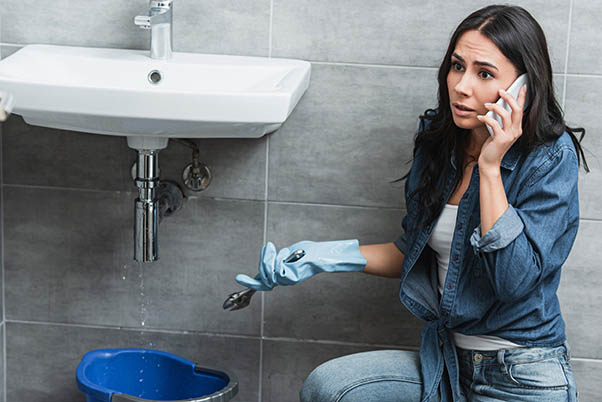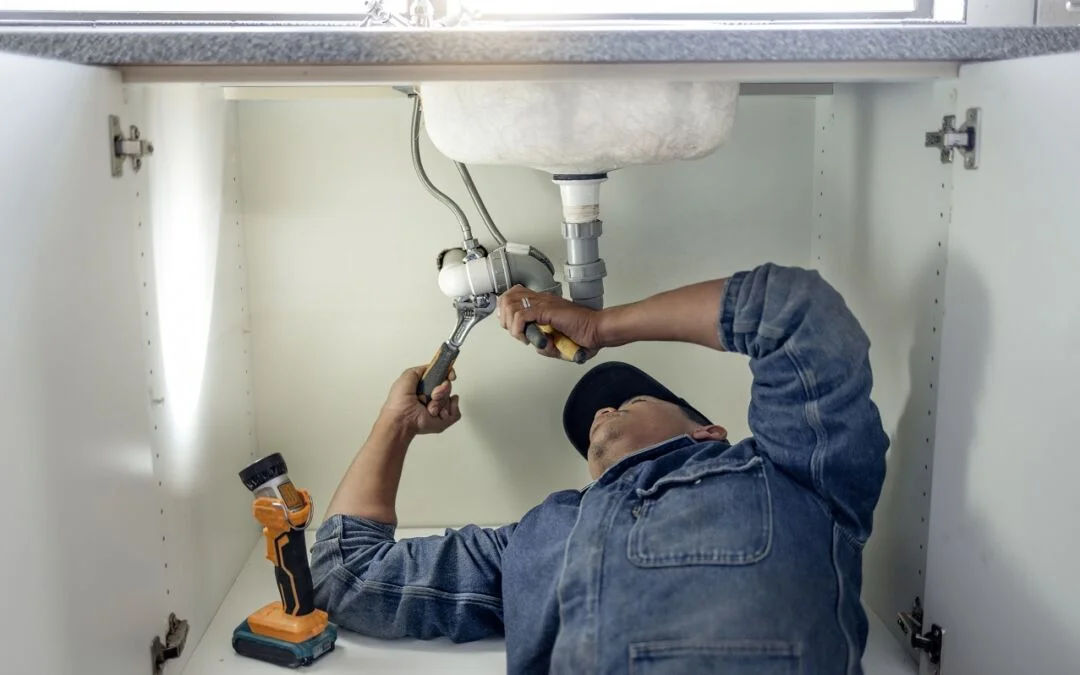Quick Solutions for Emergencies Until Support Arrives
Quick Solutions for Emergencies Until Support Arrives
Blog Article
We have uncovered this article involving Expert Tips for Managing a Plumbing Emergency Until Help Arrives below on the web and decided it made good sense to share it with you in this article.

Pipes emergencies can strike any time, causing anxiety and possible damage to your home. Whether it's a burst pipe, a clogged up drain, or a dripping faucet, recognizing exactly how to manage the scenario up until an expert plumber gets here can save you from additional problems. This article supplies vital emergency pipes suggestions to help you alleviate damage and reclaim control during a pipes crisis.
Shut off the Water Supply
The very first step in any type of pipes emergency is to shut down the supply of water. For local problems, such as a dripping faucet or commode, turn off the valve near the component. When it comes to a significant leakage or burst pipeline, situate your home's main water shut-off valve and transform it off immediately. Knowing the place of these shutoffs ahead of time can save important time throughout an emergency situation.
Address Small Leakages with Temporary Fixes
Little leakages can promptly become considerable issues if left uncontrolled. Use these temporary repairs up until specialist aid arrives:
While these solutions aren't long-term, they can assist lessen water loss and damages.
Unclog Drains Pipes Securely
A stopped up drainpipe can be an irritating and unpleasant concern. Below's how to tackle it:
If these methods do not work, avoid making use of excessive pressure, as it may worsen the clog.
Handle Overflowing Toilets
An overflowing commode can create instant chaos. Below's what you ought to do:
Shut down Your Water Heater
In particular emergencies, such as a ruptured pipe, it's smart to shut off your hot water heater. This prevents overheating or damages to the unit when water quits streaming. Switch off the power supply to the water heater (electrical or gas) and let it cool off to stay clear of potential dangers.
Temporarily Stop a Ruptured Pipe
A burst pipeline can lead to substantial water damage in mins. To reduce the issue:
Call an expert plumbing quickly to attend to the problem completely.
Deal With Frozen Piping Thoroughly
In cooler climates, icy pipes are an usual emergency. If you presume a frozen pipeline:
Prevent Additional Damages
Taking quick action to decrease damage can save you money and time in the long run. Right here's exactly how:
. Have an Emergency Situation Pipes Package
Prepare a standard plumbing emergency set to deal with minor problems successfully. Your set ought to include:
Having these devices handy can make a substantial distinction in your capability to handle emergencies.
Know When to Call a Professional.
While quick fixes can aid momentarily, particular pipes issues call for prompt specialist interest. Call a plumbing technician if:.
Immediately getting in touch with a professional ensures the problem is fixed correctly and prevents more issues.
Final thought.
Plumbing emergencies can be frustrating, however with the best knowledge and devices, you can handle the situation properly up until help gets here. By shutting off the water supply, resolving little leaks, and making use of short-term fixes, you can reduce damages and keep your home safe. Remember, these ideas are short-term remedies; always consult a certified plumber to manage the root cause of the trouble. Preparation and quick reasoning are your best allies in any kind of plumbing emergency situation.
Emergency Plumbing: Quick Steps to Minimize Damage Before Help Arrives
Welcome to ?our? helpful guide,? “Emergency Plumbing: Quick Steps ?to ?Minimize Damage ?Before Help? Arrives”. Plumbing emergencies can lead to unanticipated ?stress and potential property damage if not addressed promptly and effectively. However, ?while professional help is definitely essential? in? such situations, there are things that you ?can ?do ?to minimize damage ?before a? plumber arrives. In this detailed, informative,? and easily? understood post, we provide you with practical,? expert advice on ?how to mitigate the? impact of common? plumbing ?emergencies. From identifying? the problem? to implementing temporary fixes,? this ?guide ?can equip you? with the? knowledge? you ?need to ?act swiftly and ?decisively,? potentially saving you? a lot ?of time, ?money and heartache. Imbibe these? critical insights and turn them into action, because when it comes? to plumbing emergencies, every minute? counts!
Understanding the ?Urgency of Plumbing Emergencies
Regardless ?of how well-maintained your? plumbing system ?may be, emergencies can happen when least expected. ?Burst pipes, ?leaks, blocked drains, gas ?leaks, and water heater issues are just samples of circumstances that call for immediate professional ?help. What? do you do when such emergencies occur? Most? importantly, how do? you minimize damage before help arrives?
First? and? foremost, stop the water flow, this ?is the? most immediate way to prevent extensive water damage. Locate your ?home’s main water valve and turn it off. If? the emergency is? a localized one,? like a? sink overflow, turning off the specific fixture’s valve under the sink will suffice. Secondly, ?switch off the electricity. ?This is ?crucial, especially ?when the? water ?leak is ?close to electrical? outlets or appliances. Lastly, clear the area; move furniture, rugs, ?and other valuables out of the ?way, especially if they are at risk? of water damage.
Recognizing Common? Signs ?of Plumbing Issues
Recognizing plumbing issues as soon as? they emerge can ?save you? from pricey repairs and potential ?water damage. For ?instance, slow drainage might suggest a blockage in? your pipes that,? if not dealt with, could result in ?a damaging overflow. Keep an eye out for? continuous dripping from your faucet even when? turned off ?- this is a clear ?sign of a faucet? issue that’s wasting water and increasing your? bill. A toilet that frequently runs? or takes a ?long time to ?refill could hint at an inner? part malfunction, while ?unusual? sounds ?- banging, whistling or gurgling – coming from your pipes signal abnormal flow or air in? the pipe.?
Increasing water bills without extra usage is also a sign of a possible leak in the system ?that causes water wastage.? Noticeable water stains or lush patches ?in? your? yard might indicate an outdoor leak. Lastly, low water ?pressure could imply a clog, a pipe problem, or even a city supply issue. Recognizing ?these signs early can provide you with ?a valuable? opportunity to address minor issues before ?they exacerbate ?into major plumbing emergencies. ?Signs? of? Common Plumbing Issues: Slow drainage Continuous dripping from? faucets High? water bills Unusual noises from ?pipes Lush patches in? yard Low water ?pressure
Preparing? an Emergency Plumbing Kit for Quick Action
A well-equipped? emergency? plumbing kit can mean the difference? between a minor ?inconvenience ?and? a? significant home ?disaster. To be? prepared for unexpected plumbing? emergencies, your ?kit should carry all the ?essentials that can help you limit ?the damage before professional help? arrives. The ?golden rule is start with? the basics? and then ?add tools as you navigate through different plumbing problems. Following are the core essentials you must? have? in ?your emergency ?plumbing kit:
Plunger: ? This ?is a versatile tool? that can clear most minor clogs in ?sinks, toilets and? drains. Pipe Wrench: Essential ?for tightening and loosening? glazed? pipes. Pliers: Handy for gripping? small objects. Screwdriver ?Set: Used for ?removing ?or? tightening different fixtures. Teflon ?Tape: ? Can be wrapped around? fittings? and joints to ?prevent minor? leaks. Bucket: A simple bucket can be used for multiple purposes from catching leaks ?to carrying tools or storing? removed? parts. Effective DIY Methods to Minimize Damage Before Help Arrives
When you promptly recognize a plumbing emergency, you can employ several DIY methods ?to mitigate potential harm while waiting for a professional plumber. ?Initially, it’s crucial? to ?turn? off the water supply ?to ?stop further flooding. If you’re encountering a local problem—like a? record-breaking overflow? from your toilet—its dedicated ?water valve? will usually be ?located ?behind the fixture. However,? if the? issue seems to be? more pervasive, you can cut your ?whole house’s water supply,? typically found near ?your water meter or at the? street.

Do you appreciate more info about ? Leave feedback directly below. We will be pleased to hear your views about this page. We hope that you visit us again in the future. Sharing is nice. One never knows, you may be doing someone a favor. Thanks a lot for your time invested reading it.
Call Today Report this page